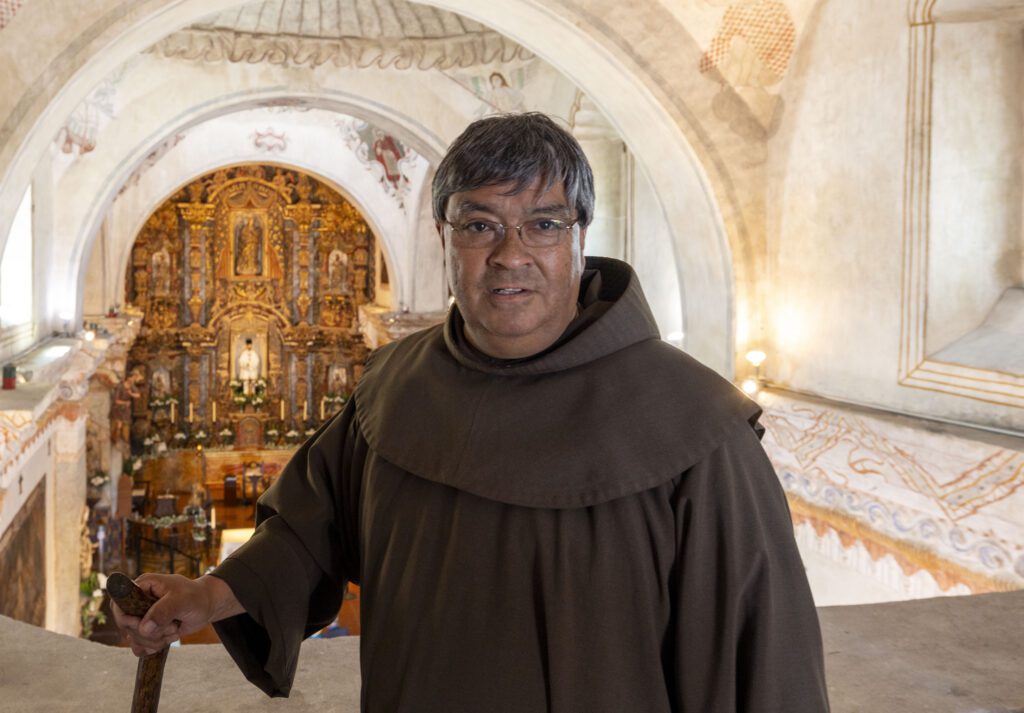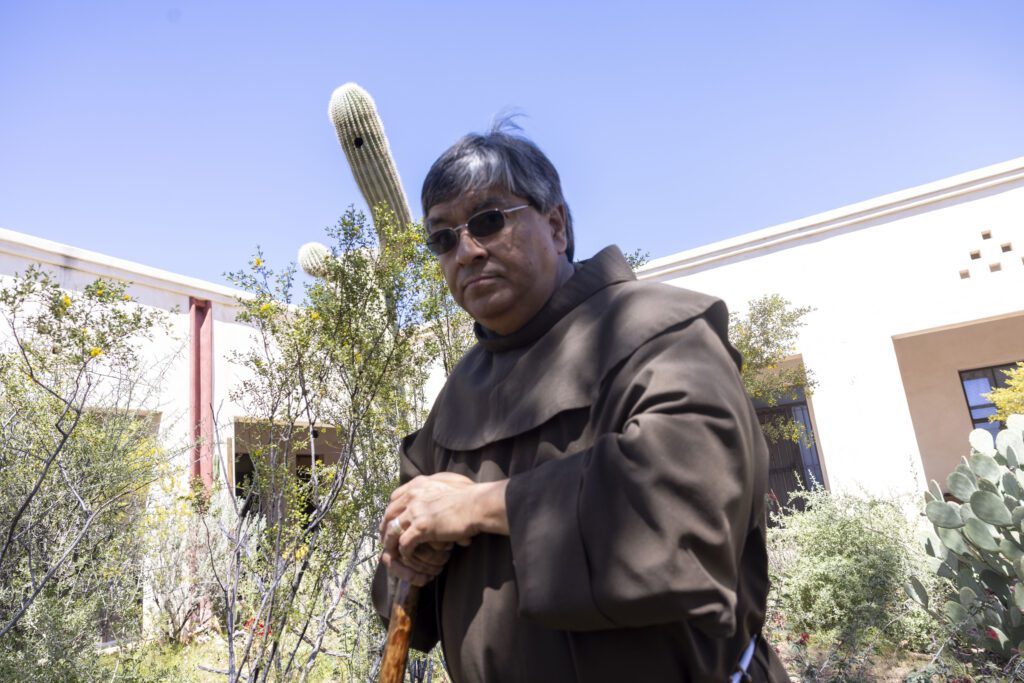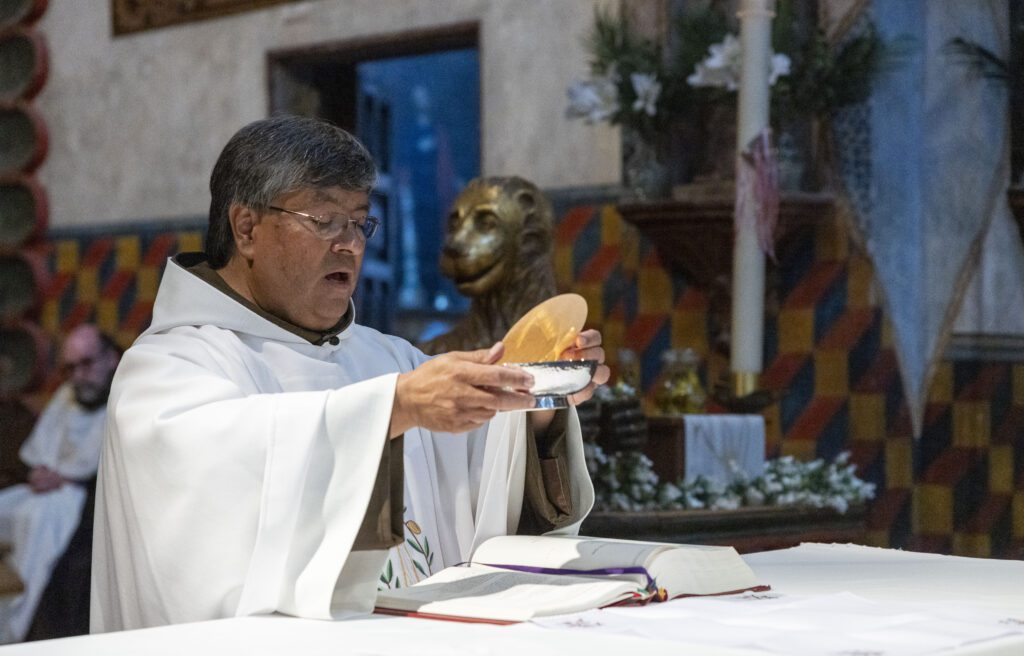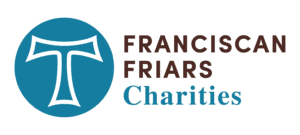
Father Ponchie Vasquez, OFM, shepherds one of the largest parishes, in area, and also among the poorest that can be found anywhere in the United States.
San Xavier del Bac Mission lies just 10 miles south of downtown Tucson, Arizona, and contains nearly 72,000 acres of Sonoran Desert. There you will find the Tohono O’odham people, whose name translates to Desert People. They total around 33,643 with about 2,300 being part of the parish mission area.
Father Ponchie Vasquez, OFM, shepherds one of the largest parishes, in area, and also among the poorest that can be found anywhere in the United States.
San Xavier del Bac Mission lies just 10 miles south of downtown Tucson, Arizona, and contains nearly 72,000 acres of Sonoran Desert. There you will find the Tohono O’odham people, whose name translates to Desert People. They total around 33,643 with about 2,300 being part of the parish mission area.
They suffer from high suicide rates, gang activity, unemployment, immigration concerns and drug trafficking.
It is a bleak picture. Yet Fr. Ponchie oozes an upbeat demeanor in his voice while talking about his ministry. Fr. Ponchie has been at the Mission since 2022. He previously served at another adjoining mission parish for a total of 13 years among indigenous Arizona communities.
The desert at its best encourages solitude, at its worst deadly isolation. Fr. Ponchie – maybe because he has spent so much of his life in the desert – revels in community

and is a non-stop talker always with a quick insight into Franciscan ministry.
As an outsider, Father Ponchie realizes that acceptance is a long-term project.
Even after 13 years, “they consider you a visitor. They are in for the long haul,” he says. His philosophy of mission focuses on presence.
“You have to go out and live among them. You have to sit on a rock and be with them,” he says. Much of his ministry involves providing the sacraments and praying with the long-established community. He’s also provided water and other basic needs to migrants passing through from Mexico and Central America.
Being in many ways a cultural outsider is nothing new for Fr. Ponchie, who arrived at the minor seminary at Santa Barbara, California, in 1978. He was only 15-years old, a Tejano kid from Fort Worth, Texas, who had never met a Franciscan until coming to the California mission.

Deep in the heart of Texas he was inspired by books about St. Francis, inspiring him to seek out the friars in Santa Barbara, a half-continent away.
The young Ponchie learned his vocation via Franciscan community. Still he considers his family life back in Texas as excellent mission training. He is a proud Tejano, with five generations in Texas, growing out of the Mexican mestizo culture. Tejanos learn early to navigate the
cultures of Anglo, Spanish and the indigenous, embracing Spanglish and inspired by deep Texas roots. Good training for a future missionary.
Was it a rash choice to trust his vocation to a group he had never met as a 15-year-old who had never ventured far from home?
“Why I entered, and why I stay are different reasons,” he says. Throughout the process of his Franciscan training, “I fell in love with God.”
His ministry demands patience. Each group has its own culture, its own way of doing things. The people he ministers to now are more urban, tied into the life of the greater Tucson region. Previously he worked with groups that are much more rural and isolated.
“Everything is done with extra consideration,” he says. Meetings are held, people are listened to. One recent issue discussed in tribal councils is the plight of migrants traveling through their lands from the nearby Mexican border, an issue that Fr. Ponchie and other friars have a stake in, seeing migrants as part of their mission of hospitality. But long meetings get them to hear another side, stories recounted of some migrants who mistreated the locals as they passed through. The tribal leadership tries to reconcile the value of hospitality with the need for security.
In a You Tube video on Franciscan vocations, Fr. Ponchie offered advice to those contemplating a religious vocation. He suggested that they consciously place themselves in uncomfortable and difficult situations.
It’s obvious he has lived that message, ever since as a 15-year-old landing at the Santa Barbara Mission, known for its mild climate and prosperous communities. Yet Fr. Ponchie has nurtured that vocation in harsher desert places.
The desert plays a major role in the Scriptures. In its vastness, it is where Jesus encountered his Father and sought prayer away from the crowds of the villages. For Fr. Ponchie, it is the place where he continues to renew his Franciscan vocation.
“It’s where we are told to go to find the peace of God. He always tells us to go to the desert,” he says.

